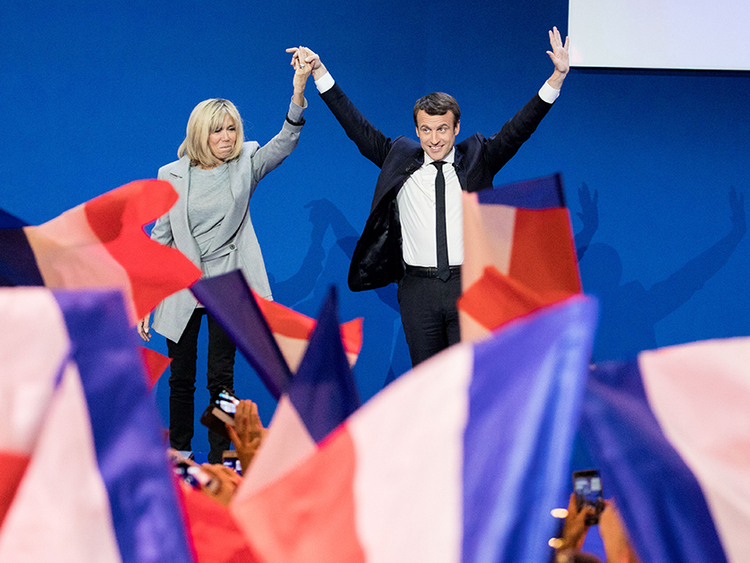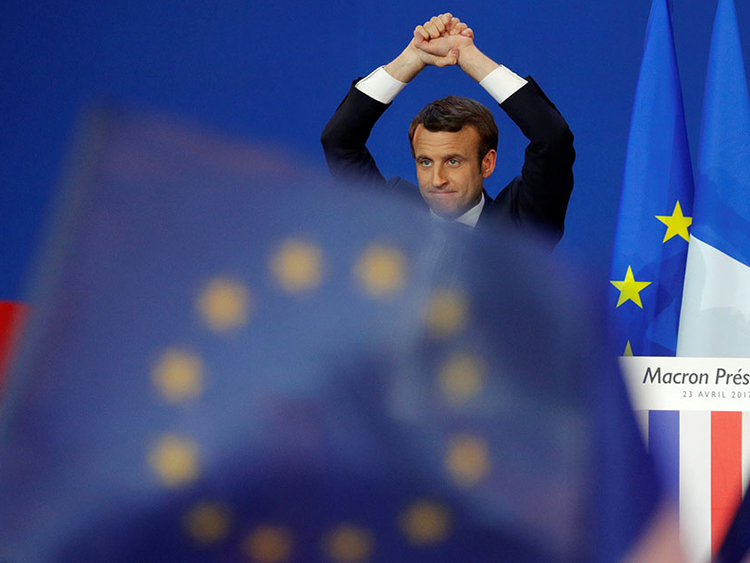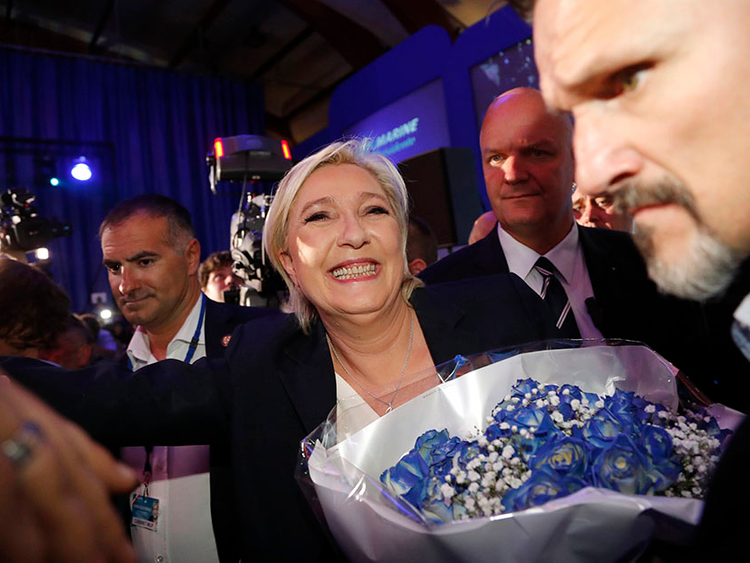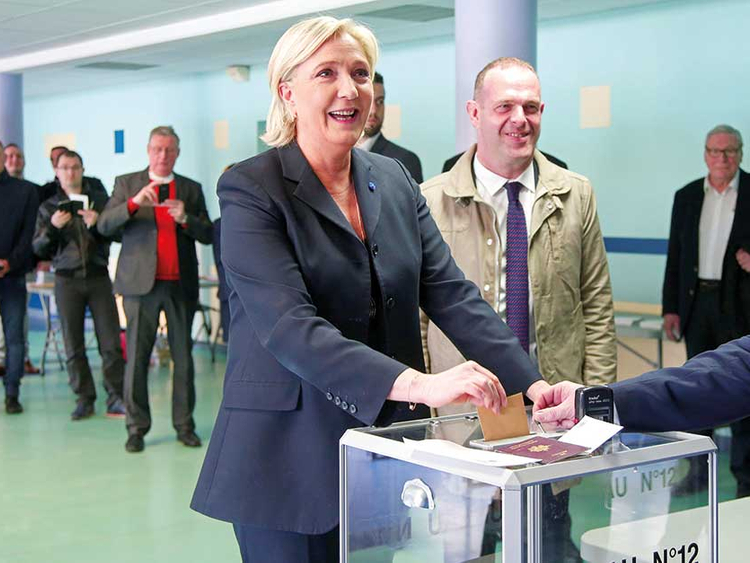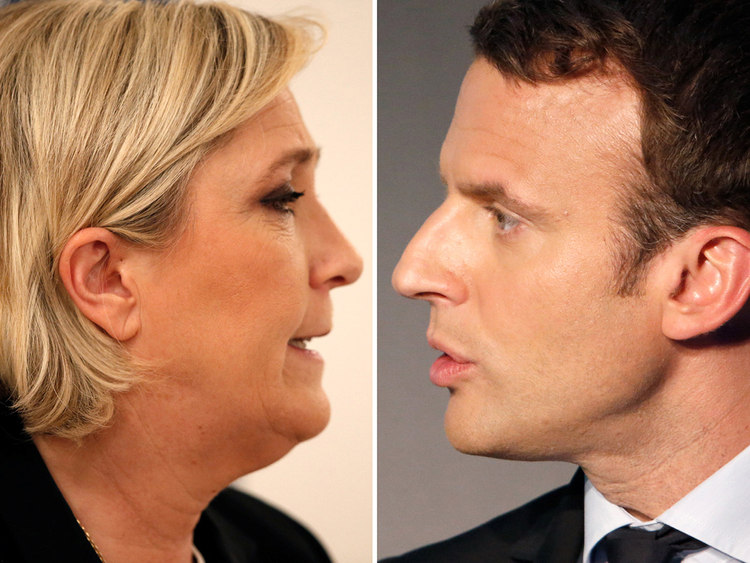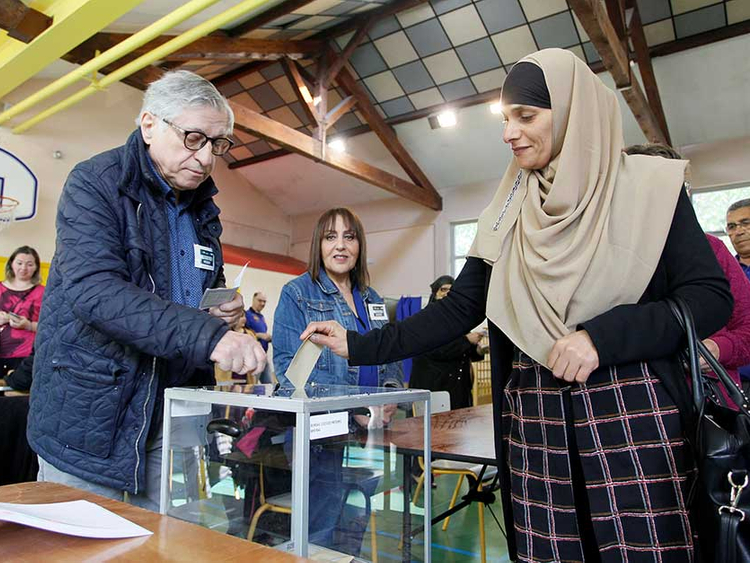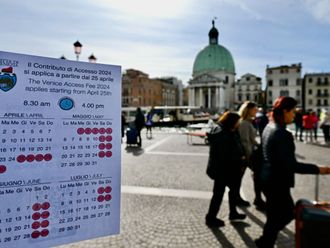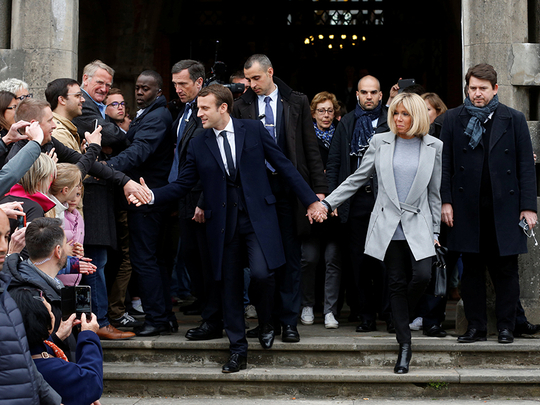
Emmanuel Macron and far-right leader Marine Le Pen are set to face each other in a May 7 runoff for the French presidency after coming first and second in Sunday's first round of voting. Follow our coverage here:
Top French politicians back Macron in runoff against Le Pen
Leading politicians from across France's left-right divide on Sunday threw their weight behind Emmanuel Macron ahead of a presidential run-off between the pro-EU centrist and the far-right's Marine Le Pen.
Macron led on Sunday the first round of voting for president, with projections based on partial results showing him polling 23-24 percent to Le Pen's 21.6-23 percent.
The two go through to a second round on May 7. Nine other candidates were eliminated.
In a victory speech on Sunday, Macron told supporters of his fledgling En Marche! (Onwards!) movement: "In one year, we have changed the face of French politics." He went on to say he would bring in new faces and talent to transform a stale political system if elected.
France's Le Pen hails 'historic' result after reaching runoff
French far-right leader Marine Le Pen hailed a "historic" result on Sunday after projected results showed her reaching the runoff of the presidential election along with pro-EU centrist Emmanuel Macron.
"The first step... has been taken. This result is historic," Le Pen, 48, told supporters in her northern stronghold of Henin-Beaumont, declaring it "time to liberate the French people".
"The major issue of this election is runaway globalisation, which is putting our civilisation in danger," she said.
"The French have a very simple choice. Either we continue on the path of... offshoring jobs, unfair foreign competition, mass immigration and free movement of terrorists... or you chose France and borders that protect," she added.
Le Pen has followed in the footsteps of her father Jean-Marie, who beat the Socialist candidate for a spot in the second round of the 2002 presidential election.
The elder Le Pen suffered a stinging defeat in the runoff, with the mainstream parties all closing ranks around the conservative, and ultimately victorious, Jacques Chirac.
'We're turning a page in French political history'
French centrist Emmanuel Macron on Sunday welcomed projections showing him reaching the runoff of the country's presidential election together with far-right candidate Marine Le Pen.
"The French have expressed their desire for change," Macron told AFP in a statement, adding: "We're clearly turning a page in French political history."
French Socialist candidate admits 'historic drubbing'
Defated Socialist candidate Benoit Hamon said Sunday the left had suffered a "historic drubbing" in the first round of France's presidential election.
While vowing that the "left is not dead", Hamon, who came in fifth according to projections, urged his supporters to vote for first-placed centrist Emmanuel Macron in a May 7 run-off, in order to block the election of far-right candidate Marine Le Pen, who finished second.
Macron ally says 'deep malaise' in French society
The elimination of the two mainstream French parties from the first round of presidential elections on Sunday showed the deep malaise of French society, a member of centrist Emmanuel Macron's campaign said on Sunday.
Macron, a pro-European Union ex-banker and economy minister who founded his own party only a year ago, was projected to get 24 percent by the pollster Harris and 23.7 percent by Elabe. Le Pen, leader of the anti-immigration and anti-EU National Front, was given 22 percent by both institutes.
Macron and Le Pen make it to Round 2
French centrist Emmanuel Macron has come out on top in the first round of France's presidential election with far right leader Marine Le Pen in second place, which means both have qualified for the May 7 runoff vote, pollsters projections from partial results showed on Sunday.
Macron won 23.7 per cent of the vote and Le Pen 21.7 per cent, an Ipsos/Sopra Steria estimate showed. Macron got 23 per cent of the vote and Le Pen got 22 per cent in an estimate from Harris Interactive. An Ifop estimate put Macron at 23.8 and Le Pen at 21.6 per cent.
Results expected shortly
Most polls closed at 19.00 local time. Votes are being counted and first results are expected at 8pm local time, that is 10pm UAE time.
Caribbean territories lag behind main land
Presidential voting in France's Caribbean territories seems to have lagged behind that on the mainland.
Official figures show that only about 35 percent of the 311,000 eligible voters on the French island of Martinique had voted by 5 p.m. local time Saturday, two hours before polls closed. Final figures were being released with Sunday's results.
The percentage was even lower elsewhere: Just 34 percent in Guadeloupe and 20 per cent in Saint-Martin.
In Martinique, Fort-de-France Mayor Didier Laguerre tells the Martinique 1ere radio station that most voters are probably waiting for a runoff.
Turnout reaches 69 per cent
Voter turnout in France's close presidential election is above 69 percent in late afternoon, almost as high as the last presidential vote.
The Interior Ministry announced Sunday that the turnout had reached 69.4 percent, compared to 70.6 percent in the first round of presidential voting in 2012.
After years of economic stagnation and high unemployment, voter disillusionment is exceptionally high this year, prompting expectations of lower-than-usual turnout
Polls have suggested that far-right candidate Marine Le Pen's voters were especially motivated to cast ballots while supporters of other candidates were less convinced.
Sunny weather in much of France may have played a role. Some pollsters also said an attack on police Thursday may have prodded voters into taking part in the election.
Voter turnout high
Voter turnout is high as French voters choose among 11 presidential candidates in the most unpredictable contest in generations.
From far left to far right, young to old, 11 candidates are vying for France's presidency in an election that is being watched as an indicator of populism's global appeal
Commentators have suggested that low voter turnout would benefit far-right candidate Ms Le Pen, whose supporters are more certain to vote in a low turnout election than those of other candidates.
All candidates had voted by lunch.
Le Pen voted in Hénin Beaumont, northern France, where topless demonstrators from the Femen activist group were detained before her arrival after jumping out of an SUV limo wearing masks of Le Pen and US President Donald Trump.
Macron voted in the coastal town of Le Touquet in northern France alongside his wife Brigitte Macron.
Fillon voted in Paris, but his British wife was conspicuously absent, casting her ballot near their country home in the Sarthe. Welsh-born Penelope Fillon, 61, was handed preliminary charges for her role in a fake jobs scandal - dubbed "Penelopegate" - that had threatened to derail her husband's campaign.
A host of public figures issued a call to the French not to abstain, with Carla Bruni-Sarkozy, the former French first lady, pleading with the French to vote "even if it's not for my guy" - who lost primaries for the Right-wing Républicains party. Vote even if "you are scared," and even "dragging your feet", she pleaded.
France’s place in Europe at issue in vote
PARIS: France voted on Sunday in the first round of a bitterly fought presidential election that could define the future of the European Union, and is sure to be seen as a gauge of the anti-establishment anger that has brought upsets in Western politics.
Over 50,000 police and 7,000 soldiers backed by rapid response units patrolled streets three days after a suspected Islamist gunman shot dead a policeman and wounded two others in the heart of the capital, Paris.
Voters will decide whether to back a pro-EU centrist newcomer, a scandal-ridden veteran conservative who wants to slash public expenditure, a far-left Euro-sceptic admirer of Fidel Castro, or a far-right nationalist who, as France’s first woman president, would shut borders and ditch the euro.
The outcome will show whether the populist tide that saw Britain vote to leave the EU and Donald Trump elected president of the United States is still rising, or starting to ebb.
But it also provides a choice between radically different recipes for reviving a listless economy that lags its neighbours, and where almost a quarter of under-25s have no job.
A high level of indecision added to the nervousness.
Hanan Fanidi, a 33-year-old financial project manager, was still unsure as she arrived at a polling station in Paris’s 18th arrondissement.
“I don’t believe in anyone, actually. I haven’t arrived at any candidate in particular who could advance things,” she said.
“I’m very, very pessimistic.” Despite fears that broad disillusionment with politics could keep voters away, the early turnout, in fair weather nationwide, was marginally up on the last election, in 2012.
Emmanuel Macron, 39, a centrist ex-banker who set up his party just a year ago, is the opinion polls’ favourite to win the first round and then beat far-right National Front leader Marine Le Pen in the two-person runoff on May 7.
If they come first and second on Sunday, it would virtually reinvent a political landscape dominated for 60 years by mainstream groupings from the centre-left and centre-right.
“It wouldn’t be the classic left-versus-right divide but two views of the world clashing,” said Ifop pollsters’ Jerome Fourquet. “Macron bills himself as the progressive versus conservatives, Le Pen as the patriot versus the globalists.” While Macron offers a vision of gradual economic deregulation that would cause few ripples on global financial markets, Le Pen proposes a more disruptive programme of higher social spending, financed by money-printing, coupled with a withdrawal from the euro and possibly the EU.
Of the two other candidates close enough in opinion polls to be in with a good chance of making the runoff, Jean-Luc Melenchon offers a far-left tax-and-spend platform that has much in common with Le Pen’s, although without her plans to restrict immigration.
And conservative Francois Fillon, rebounding after being plagued for months by a fake jobs scandal, promises economic shock therapy of deregulation and slashing taxes and state spending, cutting half a million state sector jobs.
The seven other candidates, including the ruling Socialist party’s Benoit Hamon, lag far behind.
In a polling station in Lyon, long-time left-wing voter Julien Rossi, 42, said he had been won over by Macron. “We’re from the same generation. He goes down well abroad. He’s the most open of the candidates.” By noon (1000 GMT), turnout was 28.54 per cent, according to official figures — around the same as in 2012, in which almost 80 per cent eventually took part in the first round.
Some polls have been predicting a turnout closer to the 70 per cent that took the National Front’s then-leader, Jean-Marie Le Pen, into the second round in 2002. Pollsters are unclear about what a low or high turnout could mean in 2017.
It’s the economy
Pollsters say jobs, the economy and the general trustworthiness of politicians are voters’ main concerns.
But security has re-entered the debate since Thursday’s killing of a policeman on the Avenue des Champs-Elysees, and the arrest in Marseille on Tuesday of two men suspected of planning an imminent Islamist attack.
Le Pen has emphasised the Islamist threat and promised tougher border controls, and some argue that the incident increases her chances. But previous attacks, such as the killing of 130 people in Paris by Islamist gunmen in November 2015 ahead of regional polls, have not appeared to affect voting.
One polling station in Besancon, in eastern France, was evacuated on Sunday after a stolen vehicle was abandoned nearby with the engine running.
The possibility of a Le Pen-Melenchon run-off is not the most likely scenario but is one that alarms bankers and investors.
While Macron wants to further beef up the Eurozone, Le Pen has told supporters “the EU will die”. She wants to return to the Franc, re-denominate the country’s debt stock, tax imports and reject international treaties.
Melenchon also wants to radically overhaul the European Union and hold a referendum on whether to leave the bloc.
Both would struggle, in parliamentary elections in June, to win a majority to carry out such radical moves, but their growing popularity also worries France’s EU partners.
“It is no secret that we will not be cheering madly should Sunday’s result produce a second round between Le Pen and Melenchon,” German Finance Minister Wolfgang Schaeuble said.


